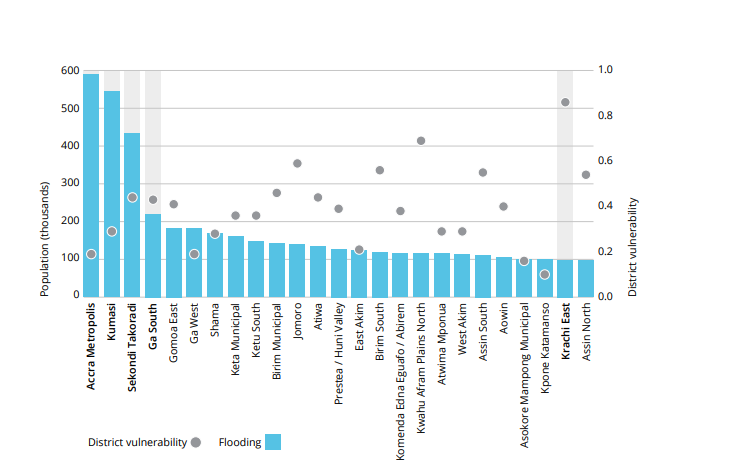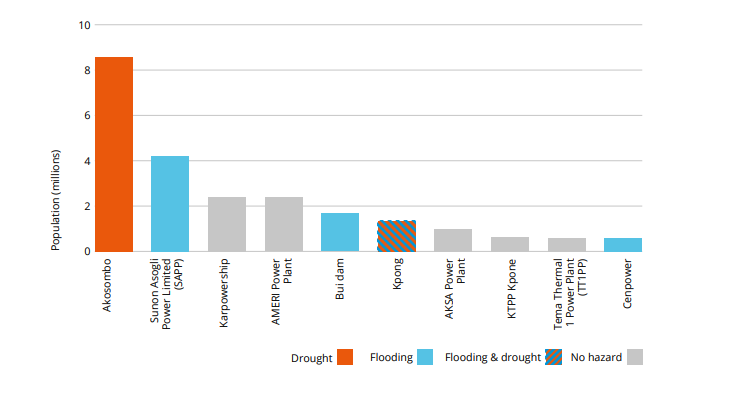A new report has estimated that road flooding could cause damages worth $3.9 billion to the Ministry of Road and Transport by 2050.
According to the study, the potential amount to be lost is thrice the US$1.3 billion investment made in the sector in 2019.
“Using assumptions on rehabilitation costs linked to road types, pavement conditions, and lanes, estimated damages can be calculated, amounting to up to 3.9 billion USD in damages on a national scale in a likely future flooding scenario,” the study noted.
The study titled, “Ghana: Roadmap for Resilient Infrastructure in a Changing Climate” was led by the Ministry of Science, Environment, Technology and Innovation in partnership with the Global Center on Adaptation.
It was based on an assessment of climate change threats to the energy, transport and water sectors.
The research which was conducted using a high hazard scenario, which they referred to as the highest likelihood of flood events found that five districts would be most exposed to road flooding by 2050.
The most-exposed districts; Accra Metropolis, Kumasi Metropolis, Sekondi-Takoradi, Ga South and Krachi East could have a population of 1,885,149 losing access to healthcare in the likelihood of flood events.

“The largest was seen in the Accra Metropolis district within the Greater Accra region, where the estimated damage losses exceeded US 130 million USD. Losses are also high in the Northern and Western parts of the country,” the report said.
In the energy sector, the study concluded that the Akosombo hydroelectric power plant with 1020 MW generation capacity and serving over 8.6 million people, will be affected by exposure to high drought intensity.
The Kpong dam can also be affected by drought hazards in addition to flooding, which can impact its 160 MW generation potential and the 1.3 million people it serves.
The Sunon-Asogli thermal power plant at Tema, which has a generation capacity of 560 MW and serves over 4 million people, is exposed to river flooding hazards and the 400 MW Bui dam is also exposed to river flooding.

It further indicated that the projected impacts of climate change could intensify the pressure on the country’s present dam infrastructure leading to severe consequences for river runoff, which could affect over 1.3 million people, mostly women and children.
However, the study proposed some interventions for addressing risks through targeted adaptation options in the built and natural environments, including nature-based solutions.
The study was carried out under the Africa Adaptation Acceleration Programme, a partnership of the African Development Bank (AfDB) Group and the Global Center on Adaptation, with support from the United Nations Office for Project Services, the United Nations Environment Program, and the University of Oxford’s Environmental Change Institute.
Latest Stories
-
Assenso-Boakye’s comment that development is dependent on partisan politics worrying – CDD Ghana Fellow
12 mins -
Samira Bawumia lauds Kanéval, others for igniting passion for reading among children
15 mins -
Some supporters of Movement for Change return to NPP
35 mins -
NPP running mate saga: Stop putting pressure on Bawumia – Group tells lobbyists
40 mins -
IES calls for immediate removal of Matthew Opoku Prempeh over deteriorating energy crisis
1 hour -
GFA reschedule selected MD 28 fixtures to ensure maximum support for Dreams FC
1 hour -
A new financing model for SHS will leverage private sector to finance infrastructure – Bawumia to CHASS
1 hour -
Earth Day: CCCFS promotes adoption of ceramics to fight plastic pollution
2 hours -
Ten dead as navy helicopters collide mid-air in Malaysia
2 hours -
Kwadaso Onion Market: Traders relocated over security concerns
3 hours -
Organise your dumsor demo, we’ll choose who to partner for ours – Franklin Cudjoe tells Yvonne Nelson
3 hours -
Government to consolidate cash waterfall revenue collection accounts
3 hours -
‘Otumfuor is one of Kotoko’s biggest issues’ – Nana Agyemang
3 hours -
Bawumia travels to Italy and Vatican State
3 hours -
Bellingham wins Laureus Breakthrough award
4 hours

